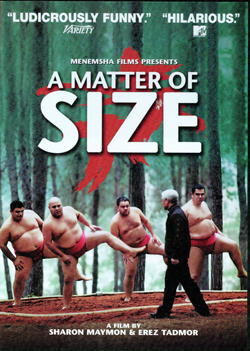By Donald H. Harrison

 SAN DIEGO — Many of us have seen the previews– or in some cases the actual television episodes — of The Biggest Loser in which very heavy people, through diet and exercise, compete to shed the most weight. The TV show–complete with tears and hugs of those who have transformed their bodies–reinforces the message pounded at us by diet products, gyms, health plans and Victoria’s Secret commercials, that slim is sexy, and fat is disgusting.
SAN DIEGO — Many of us have seen the previews– or in some cases the actual television episodes — of The Biggest Loser in which very heavy people, through diet and exercise, compete to shed the most weight. The TV show–complete with tears and hugs of those who have transformed their bodies–reinforces the message pounded at us by diet products, gyms, health plans and Victoria’s Secret commercials, that slim is sexy, and fat is disgusting.
There is a counterpoint on American TV, and that’s the comedy series Mike and Molly starring Billy Gardell and Melissa McCarthy (who recently won an Emmy for her role). Both of them are quite heavy, but compared to her dysfunctional family and his zany partner in the police squad car, they are the most normal characters in the sit-com. Yes, there are a lot of fat jokes in Mike and Molly but neither character appears to suffer from the self-loathing that Americans seem to thrive upon when they watch The Biggest Loser — a show in which even the title seems an insult.
Now, in time for the holiday season, when Americans tend to stuff themselves with Christmas pies, or Chanukah latkes, or with the traditional winter feasts of other religious and ethnic groups, comes another important entry in the international debate over obesity. Scheduled for DVD release on Dec. 6 is A Matter of Size, a comedy which is not, as one might guess, about male genitalia, but rather about male body weight — and to a lesser degree about female body weight as well.
The protagonist in this 90-minute Israeli movie produced by Sharon Maymon and Erez Tadmor is Herzl (Itzik Cohen) who has been much fatter than most of his contemporaries for his entire life. When he was a child, his playmates called him such names as “Mount Herzl” — the name of the Jerusalem cemetery where Israel’s leaders are buried. Although he attends a weight loss clinic in Ramle run by a shrewish leader whose weight coaching methods include insults and sarcasm, he continues to gain weight — so much so that he is fired from his job at a restaurant’s salad bar. Weight-conscious patrons don’t like looking at him.
So Herzl looks for another job and lands one washing dishes at a Japanese restaurant, where patrons enjoy watching sumo wrestling on television. He is told that Kitano (Togo Igawa), the slender owner of the restaurant, once was a sumo coach in Japan, but is hiding out in Israel from the Japanese mob. The Japanese patrons of the restaurant do not deride the sumo wrestlers they see on TV, they admire and root for them — as Herzl’s fellow Israelis might root for soccer stars. Herzl’s fascination grows. And he tells his friends at the weight loss clinic– Aharon (Ovir Benedek), Gidi (Alon Dahan), and Sammy (Shmulik Cohen) about the respect that fat people can get as sumo wrestlers, eventually recruiting them and his new girlfriend Zahava (Irit Kaplan) to the idea of forming a sumo club and persuading Kitano to be their coach.
Having always covered their girth to avoid insults from thinner people, it takes some getting used to for the men to bare their bodies, wearing only the traditional loin cloth in which to train. Much of the humor deals with the men’s reactions to their new environment, and the reactions of other Israelis to them.
Within this story is a romantic comedy — that of Herzl and Zahava. Kitano agrees to coach the men, but refuses to coach Zahava, declaring flatly that sumo is not for women. Herzl promptly quits the team in protest, but then rejoins without telling Zahava. He tries to keep this reversal from her with predictably disastrous results. Boy meets girl, boy loses girl, boy …. It’s a tried and true formula.
One can’t help but root for Herzl, a character whose name probably was no accident. In real life, Theodor Herzl was the founder of Zionism, and Israeli school children grow up memorizing his optimistic formulation that if you will it, it is no dream. The name Zahava is derived from the Hebrew word for gold. Much of the movie poses the question whether a dreamer can win his gold.
We have Israelis and Japanese contributing to our debate over body size. How American! And along the way, we learn to look past the mass and get to the inner substance of the characters. Whatever their initial perceptions, ultimately, very few people will dislike Herzl or Zahava. Except, perhaps, the manufacturers of diet products.
*
Harrison is editor of San Diego Jewish World. He may be contacted at donald.harrison@sdjewishworld.com